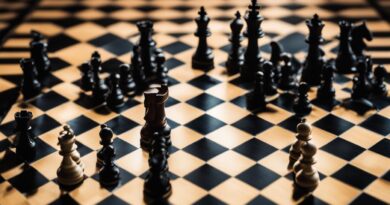Chess Books
Chess books are a great resource for everyone; from newbies to pros. They give loads of knowledge and strategies. The books are written to help you understand the complexities of the game. They also help to improve critical thinking and tactical moves. Plus, they can be your companion as you become an expert.
Uncovering the secrets of chess grandmasters is amazing. The books cover topics like openings, middle-game strategies, endgame mastery and even psychological warfare. Every page adds more knowledge to your understanding of chess.
Chess books join generations through a shared love of the game. The wisdom has been passed down from Bobby Fischer, Garry Kasparov, and others. Aspiring players can learn the same strategies that made them great.
According to “The Complete Idiot’s Guide to Chess” by Patrick Wolff, reading chess books not just helps in playing but also increases patience and discipline. Studying different strategies boosts analytical skills.
So, whether you are a beginner or a pro, chess books have plenty to offer. Use them as a gateway into the world of chess and explore endless possibilities!
Benefits of Reading Chess Books
Chess books offer many advantages. They help to improve understanding of the game and strategic thinking. Plus, they provide info on openings, tactics and endgame strategies, helping players to get better and make smarter moves.
- Enhance Strategic Thinking: Chess books show how different strategies work. This helps readers build their own style.
- Expand Knowledge: Reading chess books allows players to learn from experienced players and classic games. This makes tackling diverse challenges easier.
- Improve Decision-Making Skills: Chess books teach how to analyze positions, assess risks and make decisions under pressure. By studying annotated games, readers can sharpen their decision-making skills.
- Foster Creativity: Chess literature encourages creativity with puzzles, combinations and unorthodox ideas. This helps players find unique solutions.
Also, chess books discuss psychology, anecdotes about legendary players and advice for tournaments.
Chess has an interesting past. As an example, Bobby Fischer wrote “My 60 Memorable Games.” It showed his great gameplay and captivating annotations. This work made Fischer famous and changed how people learnt chess.
Top 10 Chess Books Every Player Should Read
Chess Books have a huge influence on a player’s growth. They are full of tactical tricks and insights, which help beginner and advanced players alike. By studying these books, players can understand the game better and become even better at playing. Here are some of the top-rated books:
- “My System” by Aron Nimzowitsch: This classic book gives a thorough approach to positional play. It has changed the way chess is played.
- “The Complete Manual of Positional Chess” by Sverre Johnsen and Leif Johannessen: This guide explains important concepts such as pawn structures, piece coordination, and strategical planning.
- “Understanding Chess Move by Move” by John Nunn: Nunn explains various moves step-by-step. It will help players get the hang of important principles.
- “Silman’s Complete Endgame Course” by Jeremy Silman: This book focuses on endgame strategies and techniques. It arms players with knowledge to outwit opponents in the last few moves of the game.
- “The Mammoth Book of Chess” edited by Graham Burgess: This collection of games analyzed by grandmasters helps players learn from masters’ gameplay.
One special book is “Chess Fundamentals” by José Capablanca. He was one of the greatest players in history. His book is full of clear explanations and examples.
To show the power of these books, here’s a story about Bobby Fischer. He discovered “My 60 Memorable Games”. It expanded his chess possibilities and improved his strategic vision. This helped him become a great player.
How to Choose the Right Chess Book for Your Level
Choosing the right chess book for yourself can be overwhelming. But it’s necessary for improving your skills and game play. Here are 3 points to consider:
- Figure out your skill level. Estimate your current chess knowledge. Are you a beginner, intermediate, or advanced? Find a book that matches your abilities and pushes you.
- Check the content. Look for books that cover topics of interest. Whether it’s opening strategies, middle game tactics, endgame techniques, or overall strategy – choose a book with insights in your preferred area.
- Read reviews and ask around. Before buying, explore online reviews and get advice from experienced players. Hearing their opinions can give you an idea of the book’s quality.
Plus, pay attention to the author. Qualified authors usually offer comprehensive explanations and fun exercises.
Also, pick a chess book that suits your learning style. Some have visual diagrams while others focus on text. Get one that resonates and makes learning enjoyable.
Fascinatingly, chess books have a long history. The first printed book was “Adventures by Game” by Pedro Damiano in 1512. Since then, many books have been written, capturing the knowledge of grandmasters.
Tips for Effective Chess Book Reading
Reading chess books is essential for skill growth. Here are tips to get the most out of your experience:
- Pick a Level Suited for You: Choose a book that matches your current level, so it’s not too hard or easy.
- Take it Slow: Don’t rush! Give yourself enough time to understand each concept.
- Visualize: Actively engage in reading by visualizing moves and variations.
- Practice: Try out the ideas from the book in real games or on a board.
- Note and Review: Write down important ideas and review them later.
Also consider:
- Develop Intuition: Don’t just rely on books. Play casual games to develop decision-making abilities.
- Every Chess Book is Unique: Each book offers different insights that can help you grow.
Ready to level up? Start now! Embrace the challenge and let each page bring you closer to mastering the game. Get to it!
Conclusion
Chess books: they are a steadfast companion on the journey to mastering this ancient game. From strategic minds to eager learners’ fingertips, they provide insights into the art of chess. Topics range from opening theory to endgame tactics; these books are guides for novices and grandmasters. Rich intellectual exploration awaits readers as they discover winning strategies and analyze games played by legendary masters.
Anecdotes in chess books depict the beauty and complexity of the game. One tale is of Wilhelm Steinitz, the first World Chess Champion. His analytical prowess revolutionized chess by focusing on strategic planning over tactical moves. His impact is still seen in modern strategies.
Chess books are more than just moves on paper. They are vessels that impart knowledge and inspiration. Aspiring players absorb wisdom from past masters and create unique paths. Every word and move studied expands understanding of this extraordinary game.

